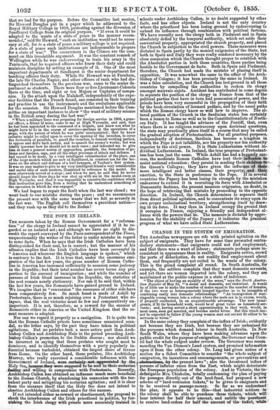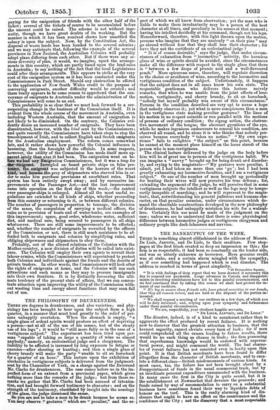CHANGE IN THE SYSTEM OF EMIGRATION.
THE Australian newspapers are rife with printed agitation on the subject of emigrants. They have for some time presented contra- dictory statements—that emigrants could not find employment, and that there was a want of labour; statements perhaps more in- consistent in appearance than in reality. Emigrants arrive, crowd the ports of debarkation, do not readily find employment about them, and frequently are not suited to the wants of the colony. This is the grand complaint all round. In South Australia, for example, the settlers complain that they want domestic servants, and yet there are women imported into the colony, and they are maintained at the public expense in a state of indolence. "The object of having an equality of the sexes," says the South Austra- lian Register of May 25, "is social and domestic, not statistical. It would be of little use to make the number of males equal to the number of females, if the two were so heterogeneously lumped together as to be incapable of combining easily into domestic relationships.' "An immigration of mar- riageable young women into a colony where the male sex is in excess, would, if properly conducted, be an unquestionable advantage. The new immi- grants, if fit for household work, would be of great value as household ser- vants; and, having served a short apprenticeship to that work, would, in most cases, soon get married, and become useful wives. But this result can- not be expected to follow if the young women sent out are not fit either to be servants or wives."
In the same colony they complain of the influx of Irish ; evidently not because they are Irish, but because they are untrained for the purposes which demand labour in South Australia. In New South Wales, where they have been making advances upon the public credit for the purpose of emigration, the Governor and Coun- cil had the whole subject under review. The Governor was recom mending the Van Diemen's Land system, and promised information upon it from the other colony. Dr. Lang had given notice of a motion for a Select Committee to consider "the whole subject of emigration its incentives and encouragements, or preventives and -olastgootiolio, by the present laws"; also the threatened influx of persons of inferior races from the East, which might deteriorate the European population of the colony. And in Victoria, the in- defatigable Mrs. Chisholm, totally condemning the plan of paying for passages directly out of the land-fund, had proposed a new scheme of "land-remission tickets," to be given to emigrants and to be received as passage-money. So far as we understand the plan, it appears to be this—that industrial settlers in the colony shall be able to purchase these tickets, which will bear interest for half their amount, and entitle the purchaser to receive land-orders for half the amount of the ticket, while' paying for the emigration of friends with the other half of the ticket ; several of the tickets of course to be accumulated before the amount could be raised. The scheme is not without inge- nuity, though we have great doubts of its working. But the manner in which it has been received shows how unsettled the colony is upon the subject. Now, by the Constitution Act, the disposed of waste lands has been handed to the several colonies ; and we may anticipate that, following the example of the several provinces in New Zealand, the Australian Colonies will probably adopt plans differing from each other. But if there were any se- rious diversity of plan, it would, we imagine, upset the arrange- ments in this country, which are partly based upon the land-sales in Australia; to say nothing of the fact that the local Legislatures could alter their arrangements. This appears to strike at the very root of the emigration system as it has been conducted under the Commissioners in Park Street. Should any obstruction be offered to the application of New South Wales credit to the purpose of conveying emigrants, another difficulty would be created ; and there really appears to be some reason to apprehend that. the con- veyance of emigrants to Australia under the administration of the Commissioners will come to an end.
This probability is so clear that we must look forward to a cor- responding change in the business of the Commission itself. It is evident from the whole course of the movement in Australia, even including Western Australia, that the amount of emigration is not likely to be diminished. On the contrary, the Colonies evi- dently desire an increased number of emigrants. They have been discontented, however, with the kind sent by the Commissioners; and quite recently the Commissioners have taken steps to stop the transhipment of Irish, and to collect English and Scotch emigrants for the Australian employment. The reform comes somewhat late, and it rather shows how powerful the Colonial influence is becoming, than the foresight of the officials. In some respects, however, the utility of the Commission has made itself more ap- parent lately than ever it had been. The emigration went on be- fore we had any Emigration Commissioners, but it was a trap for the-emigrant. Inveigled on- board private ships on false pre- tences, the emigrant was subjected to the horrors of the worst kind, and became the prey of shipmasters who starved him in or- der to make him purchase provisions at exorbitant rates. That system has been entirely swept away ; and by successive im- provements of the Passenger Act,—and the last improvement came into operation on the first day of this week,—the control over passenger-ships is enlarged. Almost all the most useful re- gulations are extended to all kinds of ships, whether proceeding from this country or returning to it, or between different colonies. The number of passengers in proportion to tonnage, the division of the sexes, the compulsion of carrying a medical officer, the rules as to provision of boats and of water-tanks, are examples of this improvement; space good order, wholesome water, sufficient diet, and medical care, being secured to passengers in all ships whatsoever. There are still some improvements to be effected; and, whether the number of emigrants be recruited by the officers of the Commission or not, there is still much assistance to be af- forded both to emigrants and colonies by simplifying rules, and obliging shipowners and shipmasters to obey them.
Probably, out of the altered relations of the Colonies with the Mother-country, a new division of duties will be called into exist- ence. The Colonies will employ their own agents to recruit their labour-armies, while the Commissioners will superintend to protect both Colonies and individuals against the frauds and the deceits of private traders. In other words, the Commissioners will look after the rights of emigrants at home, and the Colonies will use such attractions and such means as they may to procure immigrants into their own frontiers. It is by distinctly foreseeing the ulti- mate tendency of the present state of affairs, that we can colleen- trate attention upon improving the utility of the Commission with- out wasting time and energy about functions that may soon fall out of use.



























 Previous page
Previous page